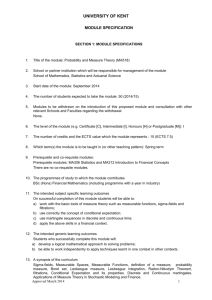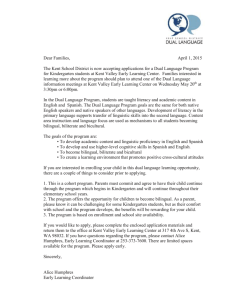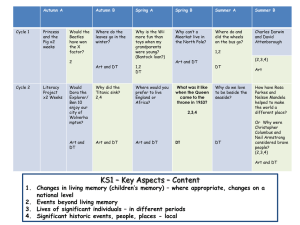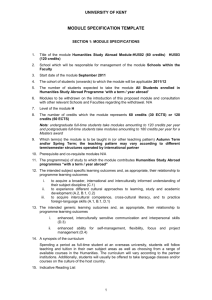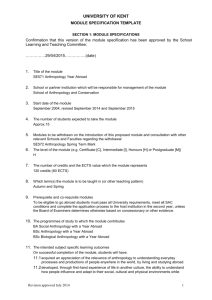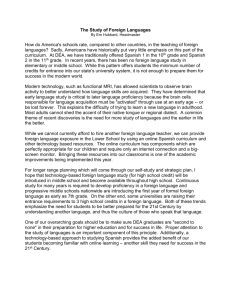UNIVERSITY OF KENT Please note: This specification provides a
advertisement
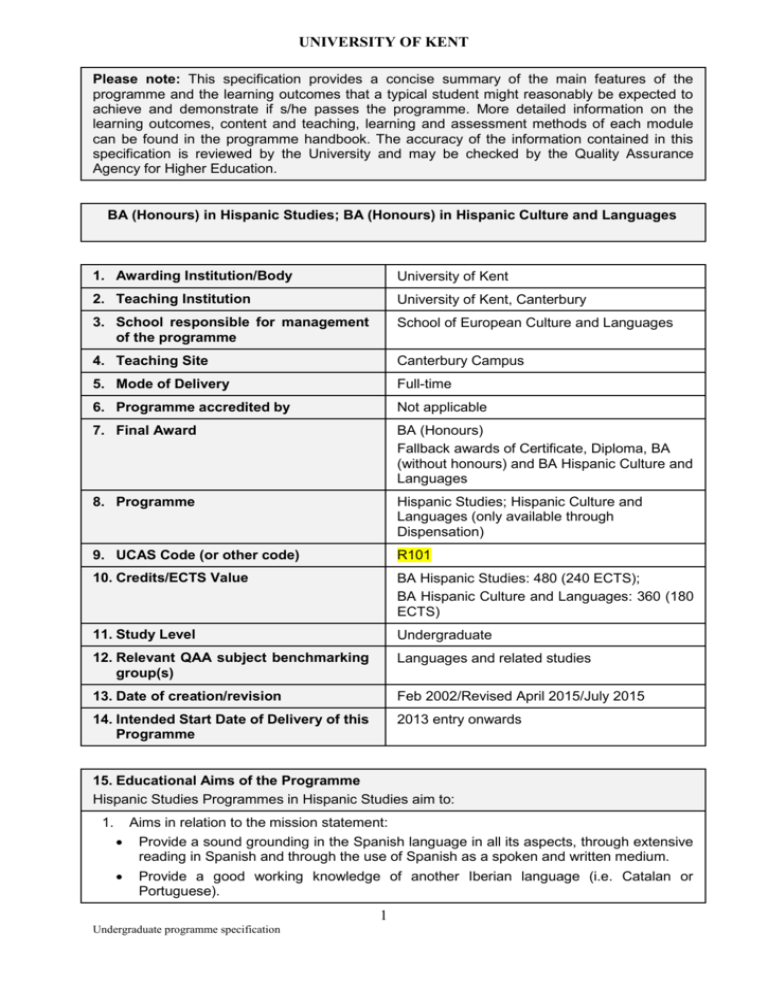
UNIVERSITY OF KENT Please note: This specification provides a concise summary of the main features of the programme and the learning outcomes that a typical student might reasonably be expected to achieve and demonstrate if s/he passes the programme. More detailed information on the learning outcomes, content and teaching, learning and assessment methods of each module can be found in the programme handbook. The accuracy of the information contained in this specification is reviewed by the University and may be checked by the Quality Assurance Agency for Higher Education. BA (Honours) in Hispanic Studies; BA (Honours) in Hispanic Culture and Languages 1. Awarding Institution/Body University of Kent 2. Teaching Institution University of Kent, Canterbury 3. School responsible for management of the programme School of European Culture and Languages 4. Teaching Site Canterbury Campus 5. Mode of Delivery Full-time 6. Programme accredited by Not applicable 7. Final Award BA (Honours) Fallback awards of Certificate, Diploma, BA (without honours) and BA Hispanic Culture and Languages 8. Programme Hispanic Studies; Hispanic Culture and Languages (only available through Dispensation) 9. UCAS Code (or other code) R101 10. Credits/ECTS Value BA Hispanic Studies: 480 (240 ECTS); BA Hispanic Culture and Languages: 360 (180 ECTS) 11. Study Level Undergraduate 12. Relevant QAA subject benchmarking group(s) Languages and related studies 13. Date of creation/revision Feb 2002/Revised April 2015/July 2015 14. Intended Start Date of Delivery of this Programme 2013 entry onwards 15. Educational Aims of the Programme Hispanic Studies Programmes in Hispanic Studies aim to: 1. Aims in relation to the mission statement: Provide a sound grounding in the Spanish language in all its aspects, through extensive reading in Spanish and through the use of Spanish as a spoken and written medium. Provide a good working knowledge of another Iberian language (i.e. Catalan or Portuguese). 1 Undergraduate programme specification UNIVERSITY OF KENT 2. Develop a critical awareness of the broad canon of Hispanic cultures and societies from the 15th century to the 21st century. Develop specialist knowledge of a range of areas within the broad canon of Hispanic studies. Train students in the field of translation from and into Spanish. Provide a gateway to related thematic studies comprising various bodies of knowledge and methodological approaches. Provide teaching which is informed by current research and scholarship and which requires students to engage with aspects of work at the frontiers of knowledge. Provide a means of access to intercultural awareness and understanding. Contribute to widening participation in higher education by offering a wide variety of entry routes. Meet the lifelong needs of a diversity of students Provide opportunities for the development of personal, communication, research and other key skills appropriate for graduate employment both in industry and in the public sector. Develop general critical, analytical and problem-solving skills which can be applied in a wide range of situations. Facilitate students’ ability to cope independently in Spanish. Build on close ties within Europe and elsewhere (notably in Spanish-speaking countries and regions), reflecting Kent’s position as the UK’s European University. Aims in relation to the learning and teaching strategy: produce graduates of value to the region, nationally and internationally, in possession of key knowledge and skills. prepare students for employment or further study. provide learning opportunities that are enjoyable experiences, involve realistic workloads, based within a research-led framework and offer appropriate support for students from a diverse range of backgrounds. provide high quality teaching in supportive environments with appropriately qualified and trained staff. For students studying BA Hons Hispanic Studies, the programme additionally aims to: Provide students with the opportunity to spend a full academic year in a Spanishspeaking country. They may attend one of the partner universities in Spain or Latin America, work as a language assistant in a school through the British Council, or arrange suitable employment (which must be verified by the University of Kent). Provide students with the opportunity to improve their spoken and written language skills in educational, professional and social contexts. Enable students to acquire or increase first-hand knowledge of the culture(s) of their target language. 16. Programme Outcomes The programme provides opportunities for students to develop and demonstrate knowledge and understanding, qualities, skills and other attributes in the following areas. The programme outcomes have references to the QAA subject benchmarking statement for Languages and Related Studies. 2 Undergraduate programme specification UNIVERSITY OF KENT A. Knowledge and Understanding of: 1. Spanish Language. 2.5-2.8, 4.3, 4.5, 4.6, 5.8, 5.9 2. Iberian Literature and cultures from the 17th to the 21st centuries. 2.10, 3.3, 5.10 3. Iberian and Latin-American History. 2.8-2.10, 3.3 4. Iberian and Latin-American Critical Theory. 2.10, 5.7 5. Iberian and Latin-American Cultural Theory. 2.7, 2.8, 5.7, 6.5, 7.12 In addition, for students studying BA (Hons) Hispanic Studies: 6. Hispanic civilisation and contemporary society, through first-hand experience. 2.7, 2.8, 2.13, 4.4, 5.7, 6.10 Teaching/learning and assessment methods and strategies used to enable outcomes to be achieved and demonstrated: This is achieved through a combination of lectures, student-led seminars, organised group work and individual/group presentations; self-directed learning is facilitated by module handbooks and the use of research based teaching materials and methods, oral classes and the use of computer assisted language learning. 6.3-6.7, 7.16, 7.17, 7.18, 7.19, 7.20. Most language classes are conducted in Spanish by native speakers. The four skills of reading, writing, listening and speaking are integrated with the study of key grammatical and syntactical structures. A wide range of sources is used to encourage familiarity with different linguistic registers and the acquisition of new vocabulary. 6.4-6.9, 2.1-2.16, 4.1-5.6. Lectures and seminars for cultural (content) module are conducted partly in Spanish, partly in English. Modules are assessed through a combination of coursework (essays, critical analyses, individual/group oral presentations), written examinations, oral examinations, and extended essays. 5.7-5.16, 6.5. In addition, for students studying BA (Hons) Hispanic Studies: If the third year is spent at one of our partner universities in a Spanish-speaking country, students must fulfil all the assessment requirements of the modules. If the year is spent on a language assistantship or work placement, students must produce an extended essay in Spanish marked by staff from Hispanic Studies at Kent. 2.13, 2.14, 5.1-5.16, 6.8-6.10. Skills and Other Attributes B. Intellectual Skills 1. Apply the skills needed for academic study and enquiry. 2.3, 2.5-2.12. 2. Evaluate information critically. 5.7, 5.11, 5.14, 7.19, 7.20. 3. Synthesise information from a number of sources in order to gain a coherent understanding of the subject. 7.15, 7.20. 4. Utilise communication skills (reading, writing, listening and speaking) for the coherent expression and transfer of knowledge. 7.11-7.15 5. Analyse, evaluate and interpret a variety of texts and other cultural products in a critical manner. 5.7, 5.14, 5.15, 7.20. 6. Study and reach conclusions independently. 6.7, 7.15, 7.20. 7. Organise and present ideas within the framework of a structured and reasoned argument.5.15, 7.15, 7.20. In addition, for students studying BA (Hons) Hispanic Studies: 8. Utilise problem-solving skills related to everyday and academic or professional life in a Spanish-speaking country. 2.13, 5.14, 6.10. 3 Undergraduate programme specification UNIVERSITY OF KENT Teaching/learning and assessment methods and strategies used to enable outcomes to be achieved and demonstrated Intellectual skills are developed through the teaching and learning programme outlined below. Each module involves critical reflection on key themes, verbal discussion and the written analysis and interpretation of the relevant material. For students taking BA (Hons) Hispanic Studies these skills will be consolidated and refined by studying or working in a Spanish-speaking country in the third year. Progress is assessed through supervised projects requiring independent research, essays, supervised class discussions, group projects, self-assessment activities and written examinations. 6.12-6.18. C. Subject-specific skills: 1. Communicate effectively in Spanish for a range of purposes and audiences. 7.11, 7.16. 2. Develop language skills in these three related areas: 4.6, 7.11. a. reception (listening and reading), b. production (speaking and writing) c. mediation between at least two languages (translation and interpreting) 3. Demonstrate detailed knowledge and effective understanding of the various structures and registers of Spanish. 4.5, 7.13, 7.18. 4. Translate accurately and efficiently into and from the target language. 4.6. 5. Analyse critically a variety of texts be they journalistic, historical, visual or literary. 7.14, 7.19. 6. Gain intercultural awareness and competence, and an appreciation of cultural diversity. 2.7, 4.4, 7.12 7. Ability to mediate and display qualities of empathy in an intercultural context. 4.4, 5.16, 7.12, 7.17. In addition, for students taking BA (Hons) Hispanic Studies: 8. Acquire intercultural awareness through everyday experience of and interaction with Spanishspeaking communities. 4.4, 5.16, 6.10. Teaching/learning and assessment methods and strategies used to enable outcomes to be achieved and demonstrated All students receive initial guidance on how to identify, locate and use material available in the library and online resources. Comprehensive reading lists are provided for each module at the start of the academic year as are guidelines for the production of essays and oral presentations, and marking criteria. All module documentation is available on the Web (using the University’s Virtual Learning Environment). Discussion of theoretical and conceptual issues are integrated into all modules. Students are encouraged to evaluate a comprehensive sample of cultural perspectives and French and Francophone texts. In addition, in the third year students studying BA (Hons) Hispanic Studies spend a full academic year in a Spanish-speaking country. The programme is assessed through group work, oral presentations, oral examinations, listening and comprehension tests, written examinations, translation and interpreting tests, extended essays and dissertations. BA (Hons) Hispanic Studies is also assessed through year abroad studies and essays. D. Transferable Skills: 1. Communicate effectively with a wide range of individuals using a variety of means. 5.14-5.16, 7.16, 6.20. 4 Undergraduate programme specification UNIVERSITY OF KENT 2. Evaluate one’s own academic performance. 7.20 3. Problem-solving skills in a variety of theoretical and practical situations. 5.14, 7.20. 4. Accurate and effective note-taking and summarizing skills. 5.14, 5.15, 7.20. 5. Library and bibliographical research skills. 5.15, 7.20. 6. Take responsibility for personal and professional learning and development. 5.15, 7.20. 7. Manage time and prioritize workloads, think and perform under pressure. 5.15, 7.15, 7.20. 8. Capacity for teamwork. 5.16, 7.20. 9. Leadership abilities. 5.16. 10. Work creatively and flexibly. 5.16, 7.20. 11. Deploy a range of Information Technology skills effectively, such as word processing text with footnotes, basic formatting, using email, searching databases and text-files, navigating the Web. 5.15, 7.20. In addition, for students studying BA (Hons) Hispanic Studies: 12. Develop independence and self-reliance while accommodating to and living in a Spanishspeaking country. 6.10, 7.12, 7.17, 7.20. Teaching/learning and assessment methods and strategies used to enable outcomes to be achieved and demonstrated All modules require regular written work and regular feedback on work is given to the students to help develop their power of presentation, analysis and communication both in English and in Spanish. Time management is learned as students meet deadlines and plan projects. Information Technology skills are learnt through coursework and developed through individual learning. 6.12, 6.13-6.18. Work is assessed continuously. Regular feedback and marks reflect progress. All content modules involve scheduled one-to-one feedback meetings with tutors.6.12, 6.13. For students studying BA Hons Hispanic Studies, these skills will be consolidated and refined by studying or working in a French-speaking country in the third year. 6.10, 6.19. For information on which modules provide which skills, see the module mapping. 17. Programme Structures and Requirements, Levels, Modules, Credits and Awards The BA (Hons) Hispanic Studies involves three years’ study at the university, plus a further year (the third of four) spent abroad. The programme is divided into four stages, each stage comprising modules to a total of 120 credits. Students must successfully complete each module in order to be awarded the specified number of credits for that module. One credit corresponds to approximately ten hours of 'learning time' (including all classes and all private study and research). Thus obtaining 120 credits in an academic year requires 1,200 hours of overall learning time. For further information on modules and credits refer to the Credit Framework at http://www.kent.ac.uk/teaching/qa/credit-framework/creditinfo.html Each module is designed to be at a specific level. For the descriptors of each of these levels, refer to Annex 2 of the Credit Framework at http://www.kent.ac.uk/teaching/qa/creditframework/creditinfoannex2.html. To be eligible for the award of an honours degree students must obtain 480 credits, at least 210 of which must be Level 5 or above, and at least 90 of which must be level 6 or above. There are 30 compulsory credits at each Stage in Spanish language. In Stage 1, students also register for the 15-credit module LS313 (autumn) or LS312 (spring) Introduction to Hispanic 5 Undergraduate programme specification UNIVERSITY OF KENT Culture. Optional modules provide a choice of subject areas, from which students will select a stated number of modules. 45 further credits in Stage 1 and 60 credits at Stages 2 & 3 will come from other Hispanic studies modules. The remaining credit, known as ‘wild’, may be selected from Hispanic Studies or other departments or schools in the Faculty. Not all modules are available every year. Details of all modules can be found at http://www.kent.ac.uk/secl/Hispanic Studies. Students who have an A or AS Level in Spanish will take LS300 Post A-Level Spanish in Stage 1 and LS505 Advanced Spanish I in Stage 2. Students who have a GCSE in Spanish or no knowledge of Spanish will register for LS302 in Stage 1 and progress to LS504 Post A-Level Spanish in Stage 2. In Stage 3 (final year) all students take LS506/LS581 Learning Spanish 5. Optional modules provide a choice of subject areas, from which students will select a stated number of modules. Where a student fails a module or modules due to illness or other mitigating circumstances, such failure may be condoned, subject to the requirements of the Credit Framework and provided that the student has achieved the programme learning outcomes. For further information refer to the Credit Framework at http://www.kent.ac.uk/teaching/qa/credit-framework/creditinfo.html. Where a student fails a module or modules, but has marks for such modules within 10 percentage points of the pass mark, the Board of Examiners may nevertheless award the credits for the module(s), subject to the requirements of the Credit Framework and provided that the student has achieved the programme learning outcomes. For further information refer to the Credit Framework. Compulsory modules cannot be condoned, compensated or trailed. The compulsory language modules at Stage 1 and 2 are not intended for bilingual or native speakers with secondary education in the relevant country. Such students who take this programme will be assessed by the relevant Language Coordinator. If the result of the assessment shows that the student’s language proficiency meets or exceeds the levels required by the learning outcomes for the relevant compulsory language module, the student must choose a suitable alternative module from the list of optional modules available in his/her chosen programme of study. This choice must be discussed with the student's Academic Adviser and approved by the relevant Director of Studies as well as by the relevant Language Coordinator. The Year Abroad will be assessed on a pass/fail basis. For students who study abroad at a partner institution for the full year, this will be based upon registering for 60 ECTS and passing a minimum of 40 ECTS. Students studying abroad for one semester only must register for 30 ECTS and pass a minimum of 20 ECTS. Those on a work placement (for a full or half a year) must complete and pass an extended essay. This essay will be marked by members of the French department at Kent. Students who study abroad for the full year and who only pass between 20 and 39 ECTS will be considered to have failed the Year Abroad and will be afforded an opportunity to retrieve the credit during Stage 3, details of which can be found in the module specification for LA514. Students who study abroad for the full year who pass fewer than 20 ECTS will be considered to have failed the Year Abroad and will not be given an opportunity to retrieve the credit. In such instances, students will be moved to the BA (Hons) Hispanic Culture and Languages. Students who choose a work placement for the full year and who fail the report will be considered to have failed the Year Abroad, and will be afforded an opportunity to retrieve the credit during Stage 3, details of which can be found in the module specification for LA514. Students who study for one semester and choose a work placement for the other semester, and who pass between 20 and 39 ECTS will be considered to have failed the Year Abroad and will be afforded an opportunity to retrieve the credit during Stage 3, details of which can be found in the module specification for LA514. Students who study abroad for one semester and choose a work placement for the other semester, and who pass fewer than 20 ECTS will be considered to have failed the Year Abroad and will not be given an opportunity to retrieve the credit. In such instances, students will be transferred to the BA (Hons) Hispanic Culture and Languages. In special circumstances, students who are unable to fulfil the Year Abroad requirements may apply 6 Undergraduate programme specification UNIVERSITY OF KENT for dispensation from the year abroad and, if their application is successful, they will be transferred to the 3-year BA (Hons) Hispanic Culture and Languages. Eligibility for dispensation is determined according to the Procedure for Dispensation from the Compulsory Year Abroad in Language Programmes. It is acknowledged that students dispensed from the Year Abroad will enter Stage 3 with a different set of language learning experiences compared to students who do spend a year abroad. In view of this, the Stage 3 language module, LS506/LS581 Learning Spanish 5, differentiates learning and assessment for the two sets of students. Students successfully completing Stage 1 of the programme and meeting credit framework requirements who do not successfully complete Stage 2 will be eligible for the award of the Certificate. Students successfully completing Stage 1 and Stage 2 of the programme and meeting credit framework requirements who do not successfully complete Stage A (Year Abroad) and 3 will be eligible for the award of the Diploma. Students successfully completing Stages 1, 2 and A of the programme and meeting credit framework requirements who do not successfully complete Stage 3 will be eligible for the award of the Diploma with a Year Abroad. Students successfully completing Stage 1 and Stage 2 of the programme and meeting credit framework requirements who do not successfully complete Stage 3 but do achieve 300 credits (with at least 150 credits at level 5 or above including at least 60 credits at level 6 or above in Stage 3), will be eligible for the award of BA without honours. Students successfully completing Stages 1, 2 and A of the programme and meeting credit framework requirements who do not successfully complete Stage 3 but do achieve 420 credits (with at least 150 credits at level 5 or above including at least 60 credits at level 6 or above in Stage 3), will be eligible for the award of BA without honours with a Year Abroad. 7 Undergraduate programme specification Code Title Stage 1 Level Credits Term(s) UNIVERSITY OF KENT Compulsory Modules (if, as identified above, the student’s language proficiency meets or exceeds the levels required by the learning outcomes for the relevant compulsory language module, the student must choose a suitable alternative module from the list of optional modules available in his/her chosen programme of study) LS300 Learning Spanish 3A or: 4 30 Autumn and Spring LS302 Learning Spanish 1 4 30 Autumn and Spring LS312 Introduction to Hispanic Culture 4 15 Spring LS313 Introduction to Hispanic Culture 4 15 Autumn Optional Modules Students must select 45 credits from the following: LS303 The Modern Spanish Novel (in translation) 4 15 Autumn or Spring LS304 The Modern Spanish Theatre (in translation) 4 15 Autumn or Spring LS308 The Modern Spanish-American Short Story 4 15 Autumn or Spring LS319 State-Building in Latin America 4 15 Autumn or Spring LA311 Cinema, Politics and Society in the Portuguese Speaking World 4 15 Autumn or Spring LA300 Learning Portuguese 1A 4 15 Autumn LA301 Learning Portuguese 1B 4 15 Spring LA306 African, Brazilian and Portuguese Literature in 4 Translation 15 Autumn or Spring LS310 Ab Initio Catalan 1A 4 15 Autumn LS311 Ab Initio Catalan 1B 4 15 Spring Stage 2 Compulsory Modules (if, as identified above, the student’s language proficiency meets or exceeds the levels required by the learning outcomes for the relevant compulsory language module, the student must choose a suitable alternative module from the list of optional modules available in his/her chosen programme of study) LS505 Learning Spanish 4 or: 5 30 Autumn and Spring LS504 Learning Spanish 3B 5 30 Autumn and Spring LS310 Learning Catalan 1A 4 15 Autumn LS311 Learning Catalan 1B 4 15 Spring Optional Modules Students must select 60 credits from the following: LA516 Women Writers in the Portuguese Speaking World 5 15 Autumn or Spring LS571 After Dictatorship: Spain and Latin America 5 15 Autumn or Spring 8 Undergraduate programme specification UNIVERSITY OF KENT LS515 Catalan Culture 5 15 Autumn or Spring LS548 Contemporary Spanish Cinema 5 15 Autumn or Spring LS562 The Legacy of Inequality: Race and Ethnicity in Latin America 5 15 Autumn or Spring LS555 Voices of a Continent 20th Century Latin American Poets 5 15 Autumn or Spring LS568 Second Year Extended Essay 5 15 Autumn or Spring LS513 Spanish Literature: Identity 5 15 Autumn or Spring LS541 Women in Spanish American Narrative and Film 5 15 Autumn or Spring LA500 Learning Portuguese 2A 5 15 Autumn LA501 Learning Portuguese 2B 5 15 Spring LS552 Learning Catalan 2A 5 15 Autumn LS553 Learning Catalan 2B 5 15 Spring LS579 Barcelona and Havana: Icon, Myth & History 5 15 Autumn or Spring LS514 Spanish Literature: Censorship 5 15 Autumn or Spring Year Abroad A 120 Autumn and Spring Stage A LA514 Stage 3 Compulsory Modules LS506 /LS581 Learning Spanish 5 or 6 30 Autumn and Spring LS547 Advanced 2 for Erasmus (or native speakers) 6 30 Autumn and Spring Optional Modules Students must select from the following: LS567 Terrorism and State Terror in Latin America 6 15 Autumn or Spring LA515 Gender and Sexuality in Afro-Luso-Brazilian 6 Cinema 15 Autumn or Spring LS550 Reading Monstrosity in Iberian Culture 6 15 Autumn or Spring LS540 The Spanish Avant-Garde 6 15 Autumn or Spring LS554 Writing the Cuban Revolution 6 15 Autumn or Spring 9 Undergraduate programme specification UNIVERSITY OF KENT 20th Century Latin H 15 Autumn Spring Final Year Dissertation H 30 Autumn and Spring SCL501 Languages in the Classroom H 15 Spring LS515 Catalan Culture I 15 Autumn or Spring SCL501 Languages in the Classroom H 15 Spring LS556 Voices of a Continent American Poets LS563 or 18. Work-Based Learning Disability Statement: Where disabled students are due to undertake a work placement as part of this programme of study, a representative of the University will meet with the work placement provider in advance to ensure the provision of anticipatory and reasonable adjustments in line with legal requirements. Where relevant to the programme of study, provide details of any work-based learning element, inclusive of employer details, delivery, assessment and support for students: 19. Support for Students and their Learning School and University induction programme Programme handbooks and module handbooks Library services, see http://www.kent.ac.uk/library/ Student Support and Wellbeing, see www.kent.ac.uk/studentsupport/ Centre for English and World Languages, see http://www.kent.ac.uk/cewl/index.html Student Learning Advisory Service, see http://www.kent.ac.uk/uelt/about/slas.html PASS system, see https://www.kent.ac.uk/uelt/quality/code2001/annexg.html Academic Adviser system Academic support system providing advice on module choice and programme structure, academic difficulties, progression routes and individual progress One-to-one feedback on coursework scheduled as part of all optional modules Staff availability during office hours Kent Union, see www.kentunion.co.uk/ Careers and Employability Services, see www.kent.ac.uk/ces/ Counselling Service www.kent.ac.uk/counselling/ Information Services (computing and library services), see www.kent.ac.uk/is/ Undergraduate student representation at School, Faculty and Institutional levels International Development Office, see www.kent.ac.uk/international/ Medical Centre, see www.kent.ac.uk/counselling/menu/Medical-Centre.html One-to one tutorial supervision of second year extended essay and final year dissertation Oral classes by native language assistants Average class size of 20 or fewer Francophone Society run by the students Student-Staff Liaison Committee Learning resources, equipment/plant: Templeman Library (with good collection of modern 10 Undergraduate programme specification UNIVERSITY OF KENT French texts, journals and newspapers), Computing Services, dedicated School AudioVisual Library and Viewing Room, Computer Assisted Language Learning Laboratories (MultiMedia labs) Module documentation, study skill support and material available on the Web 20. Entry Profile The minimum age to study a degree programme at the University is normally at least 17 years old by 20 September in the year the programme begins. There is no upper age limit. 20.1 Entry Route For fuller information, please refer to the University prospectus A levels and AS levels: 320 points (ABB) including B in Spanish or Hispanic Studies if starting the programme at post A-level standard GCSE B in French (if starting the programme at post-GCSE standard) or some aptitude for modern languages (to start at beginner’s standard). Access to HE Diploma: The University of Kent will not necessarily make conditional offers to all access applicants, but will continue to assess them on an individual basis. If an offer is made applicants will be required to obtain/pass the overall Access to Higher Education Diploma and may also be required to obtain a proportion of the total level 3 credits and/or credits in particular subjects at merit grade or above. BTEC Level 3 Extended Diploma (formerly BTEC National Diploma): The university will consider applicants holding BTEC National Diploma and Extended National Diploma Qualifications (QCF; NQF; OCR) on a case by case basis. European Baccalaureate: Average 70 points, 7 in Spanish or Hispanic Studies (plus standard English-language requirement, see below) International Baccalaureate: 34 points or 16 at HL, including a modern European language other than English 4 at HL or 5 at SL University Degree: Completion of a degree, including all the required examinations at a university in the United Kingdom or at another approved university. Accreditation of Prior Learning (APL): We shall consider any evidence applicants have of previous study and their ability to follow the proposed programme in Hispanic Studies. Mature applicants: In the case of mature applicants without traditional qualifications, we shall likewise seek proof of their ability to follow the proposed programme in Hispanic Studies. International Applicants: In addition to the above requirements, international applicants can also qualify with the following: School Certificates and Higher School Certificates awarded by a body approved by the University. Subsidiary level credit or pass = pass at GCSE, Higher School Certificate pass = pass at A-Level. Matriculation from an approved university, with a pass in English Language at GCSE/O level, or an equivalent level in an approved English language test. 11 Undergraduate programme specification UNIVERSITY OF KENT Passing one of Kent’s Foundation programmes, provided that the student meets the subject requirements for the degree course they intend to study. An examination pass accepted as equivalent to any of the above. Students who are not a native speaker of English must also, in order to enter directly into a degree programme, demonstrate their proficiency in English by a pass at the appropriate level in their 18+ school leaving certificate, through the evidence of previous university study, or through one of the following: Average 6.5 in IELTS, minimum 6.0 in reading and writing. Grade B in Cambridge Certificate of Proficiency in English. Grade A in Cambridge Advanced Certificate in English. Pass overall in the KMB/NEAB Test in English for Overseas Students, with at least B in Writing, Reading and Speaking modules. A TOEFL score of at least 600 (written test) or 250 (computer test). For applicants who have not yet reached these standards, the University offers a Foundation Programme for international students, which gives a year’s academic and language training prior to the start of a degree. Other Qualifications: European Baccalaureate Diploma; Advanced International Certificate of Education; Advanced Placement; Overseas Certificates (including other European Union Countries); The Higher School Certificate of Matriculation of approved overseas and EU authorities; American High School Diploma if accompanied by Advanced Placements (AP) Passes The University considers other qualifications similar to the ones listed above, provided they include a pass at English Language at GCSE/O level or equivalent 20.2 What does this programme have to offer? An excellent grounding in Hispanic languages, cultures, history and societies The Year Abroad requirement provides each student with the opportunity to consolidate this grounding through a year’s residence in Spain or Latin America, pursuing an approved full-time activity The opportunity to study the principles of literary and cultural criticism, and language practice within a friendly and committed department. The opportunity to study in Canterbury a major centre for European Studies within easy access of London A friendly campus with high student morale and dedicated lecturers and professors of international standing The opportunity to study alongside students from Spanish and Latin American universities spending their Year Abroad in Canterbury Language staff from different Hispanic regions 12 Undergraduate programme specification UNIVERSITY OF KENT 20.3 Personal Profile An applicant should have: A lively interest in the contemporary language and culture of Spain and/or Hispanic countries A desire to deepen knowledge of these fields A desire and willingness to travel and experience other cultures An openness to what is distinctive about and specific to Spanish/Hispanic cultures A suitable level of linguistic ability in Spanish and a willingness to develop this through reading, writing, listening and speaking A willingness to acquire the IT skills appropriate to language, literary and cultural study, for example: word processing and using the Internet A readiness to share discovery with a larger group and exchange ideas Flexibility of mind, the capacity for self-reflection and the desire to be intellectually independent and self-standing A readiness to place specialist study in a broad framework of complementary and contextual knowledge. 21. Methods for Evaluating and Enhancing the Quality and Standards of Teaching and Learning 21.1 Mechanisms for review and evaluation of teaching, learning, assessment, the curriculum and outcome standards Student module evaluations Annual programme and module monitoring reports, see http://www.kent.ac.uk/teaching/qa/codes/taught/annexe.html External Examiners system, see http://www.kent.ac.uk/teaching/qa/codes/taught/annexk.html Periodic programme review, http://www.kent.ac.uk/teaching/qa/codes/taught/annexf.html Annual staff appraisal (Reflect, Plan, Develop) Peer observation Quality Assurance Framework, http://www.kent.ac.uk/teaching/qa/codes/index.html QAA Higher Education Review, see http://www.qaa.ac.uk/InstitutionReports/types-ofreview/higher-education-review/Pages/default.aspx Personal Academic Support System Vetting process of examination questions by module team, Quality Assurance Committee and external examiners Double marking or moderating of coursework and examinations 13 Undergraduate programme specification UNIVERSITY OF KENT 21.2 Committees with responsibility for monitoring and evaluating quality and standards Staff/Student Liaison Committee School Learning and Teaching Committee Faculty Learning and Teaching Committee Faculty Board Learning and Teaching Board Modern Languages Board of Studies Board of Examiners (including external examiners) School Part-Time Studies Director School Quality Assurance Committee Faculty Ethics Committee. 21.3 Mechanisms for gaining student feedback on the quality of teaching and their learning experience Meetings with Academic Adviser Staff-student Liaison Committee One-to-one coursework feedback meetings Student Module Evaluations Informal meetings and social contact with students (including student role in recruitment activities) Student representation at Subject Level Student representation at School Level Student representation at Faculty Level Annual NSS Exit Questionnaire Final Year Programme Evaluation Year Abroad Evaluation Discussions with Tutors Discussions with Senior Tutor Involvement of students in recruitment activities Monitoring of newsgroups Erasmus monitoring visits by staff Focus groups Suggestion Box or e-mail address. 21.4 Staff Development priorities include: Postgraduate Certificate in Higher Education requirement for all new appointments and new part-time teachers HEA (associate) fellowship membership Annual staff appraisals Institutional Level Staff Development Programme Academic Practice Provision (PGCHE, ATAP and other development opportunities) Professional body membership and requirements Programme team meetings 14 Undergraduate programme specification UNIVERSITY OF KENT Conferences Study leave Institute of Learning and Teaching membership Research led teaching Links with other European Institutions Regular formal and informal collaboration in programme development Staff Development Courses Subject based Conferences/Interdisciplinary Conferences Institute of Learning and Teaching membership Attendance at relevant conferences PhD as expected qualification for appointment to lecturing posts Strong evidence of research record or potential for research leading to publication required for appointment to lecturing posts Mentoring of new lecturers Dissemination of good practice on new learning and teaching methods 22. Indicators of Quality and Standards Results of periodic programme review Professional accreditation QAA HER 2015 Annual External Examiner reports Annual programme and module monitoring reports Results of Research Assessment Exercise: ranked 7th in the UK in RAE 2008; result of REF 2014 pending# Internal and External Subject Reviews Partnership with other higher education institutions abroad Alumnae Feedback International recognition of staff research Invitations to staff to speak at international conferences and lecture at universities abroad. 22.1 The following reference points were used in creating these specifications: QAA UK Quality Code for Higher Education QAA Benchmarking Statement for Languages and Related Studies (2007) School and Faculty plan Staff research activities The University Plan and Learning and Teaching Strategy (including the School Learning and Teaching Forum) Subject produced documents Staff and Graduate Student Research 15 Undergraduate programme specification

